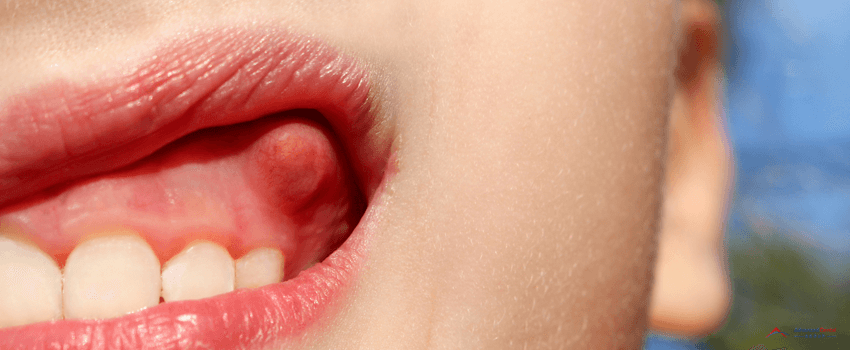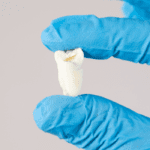Toothaches are often the first sign that you have an infection or an abscessed tooth.
A dental abscess is painful, but not always. It can also spread to other areas of the body and is not likely to heal on its own. No matter how severe or mild the pain you’re feeling is, see a dentist immediately; waiting will only increase its chances of spreading to your other teeth and gum tissues.
What is an Abscess Tooth?
A dental abscess is the pus buildup around teeth, gums, or bones holding your teeth in place. It is often caused by a bacterial infection.
An abscessed tooth’s location and severity will determine its type:
-
Gingival abscess – An infection under the gums can cause a gingival abscess. The tooth and supporting structures are not usually affected.
-
Periapical abscess – It is a pus buildup at a tooth root’s tip. It happens when bacteria from outside the tooth spread into its pulp through a crack or cavity. Leaving it untreated increases the risk of spreading the infection to the bones and tissues surrounding the tooth.
-
Periodontal abscess – It is pus accumulation due to an infection affecting the bone and supporting tissues of the tooth. Adults are more likely to experience periodontal abscesses than children.
Signs of an Abscess Tooth
The area around an abscessed tooth can sometimes hurt. You may feel a sharp, throbbing sensation when you press down on the tooth that spreads to the neck, jaw, and other areas of your face.
Visit the dentist immediately if you notice the following dental abscess symptoms:
-
More pain when lying down, disrupting your sleep.
-
Swelling and redness of the face
-
Tenderness and discoloration of teeth
-
Swollen gums
-
Temperature sensitivity
-
Bad breath and bad taste
You may also feel feverish and unwell if the infection spreads. Extreme cases cause difficulty breathing and opening the mouth; in this case, go to the emergency room as soon as possible.
Causes of Tooth Abscess
Aside from bacterial infection due to plaque buildup, abscess formation is also caused by:
Poor Oral Hygiene
Poor oral hygiene is the leading cause of tooth abscess. A National Center for Health Statistics survey found that 91% of Americans had dental caries due to poor oral hygiene. Plaque can accumulate on your teeth if you don’t floss or brush your teeth regularly. Neglecting oral health care can lead to tooth decay, gum disease, and tooth abscesses.
Starchy and Sugary Food
Consuming lots of sugary foods like sodas and sweets encourages bacterial growth and plaque buildup. This could lead to tooth decay, eventually leading to an abscess.
Injuries
Gum disease and damaged teeth allow bacteria to enter your teeth more easily.
Weak Immune System
Patients with underlying conditions like diabetes or undergoing chemotherapy or steroid medications don’t have strong immune systems that can fight off infections.
Dry Mouth
A dry mouth increases the likelihood of tooth decay. This is often a side effect of medications or aging.
Tooth Abscess Diagnosis
Your dentist will inspect your teeth and the surrounding areas. They might also:
-
Gently tap your teeth. Teeth that have an abscess are sensitive to pressure and touch.
-
Get an X-ray. X-rays can easily reveal a dental abscess.
-
Do a CT scan. Dentists can use CT scans to determine the extent and spread of infection.
Home Remedies For An Abscessed Tooth
While waiting for treatment, home remedies can help you feel more at ease. Here are some dental abscess self-care tips:
-
Avoid hot or cold food.
-
Use a soft toothbrush.
-
Chew food on the abscess-free side of your mouth.
-
Don’t floss the area around the tooth abscess.
Dental Abscess Treatments
A dentist will drain the pus from a tooth abscess and remove the infection source. How your dentist treats an abscess depends on its severity and location.
Drainage and Incision
In a dental abscess drainage and incision procedure, your dentist will inject a local anesthetic and make an incision under the gum to drain the abscess. After that, they will apply saline. They might also place a small, temporary rubber drain to decrease swelling. It will also require further treatment.
Root Canal
A root canal treatment allows dentists to remove the infection and allow you to keep your tooth that would have been extracted otherwise.
Dentists often perform root canals for periapical tooth abscesses. They drill holes into the tooth to remove the pus and damaged tissues. They fill the tooth afterward to prevent reinfection and put a crown to complete the procedure. Crowns can strengthen the teeth, especially those at the back of our mouth. They can last a lifetime if you take good care of them.
Surgery
Patients with a recurring dental infection or periapical abscess may need to have the tissue removed surgically. An oral surgeon may also reshape the gum tissue if you have a periodontal abscess or recurring infections. They will extract the tooth if the dental abscess returns even after surgery.
Pain Killers
You can also take some painkillers to manage your pain while waiting for dental treatment. Ibuprofen is the best painkiller to take when you have a dental abscess. You can also take paracetamol if you can’t take ibuprofen for medical reasons.
Some pain medications are not appropriate for some patients. Do not take ibuprofen if you have asthma or stomach cancer. Children under 16 and women who are pregnant or nursing should not take aspirin.
Antibiotics
Your dentist might also recommend antibiotics with painkillers to prevent the infection from spreading. Patients should not use dental abscess antibiotics to delay treatments or as a replacement for dental treatment.
Tooth Abscess Prevention
Healthy teeth and gums significantly reduce the chances of an abscessed tooth. Here are some ways to keep them healthy:
-
Use floss or an interdental brush at least once a day to clean between your teeth.
-
Brush your teeth with fluoride toothpaste twice daily for two minutes.
-
Spit out the toothpaste instead of rinsing your mouth after brushing.
-
Reduce your consumption of sugary and starchy foods and drinks, especially between meals and before going to bed.
-
Visit your dentist regularly.
-
Drink fluoridated water.
-
Replace your toothbrush every 3-4 months or whenever its bristles get frayed.
Get Your Abscessed Tooth Checked Today
You should never ignore a tooth abscess. Our affiliate dentists in Dillon, CO can treat an abscessed tooth and other dental problems. They can also make dentures and implants if you have missing teeth that need replacing. Call us soon, and we’ll connect them to you right away. We’re here to help you reach optimum oral health.





